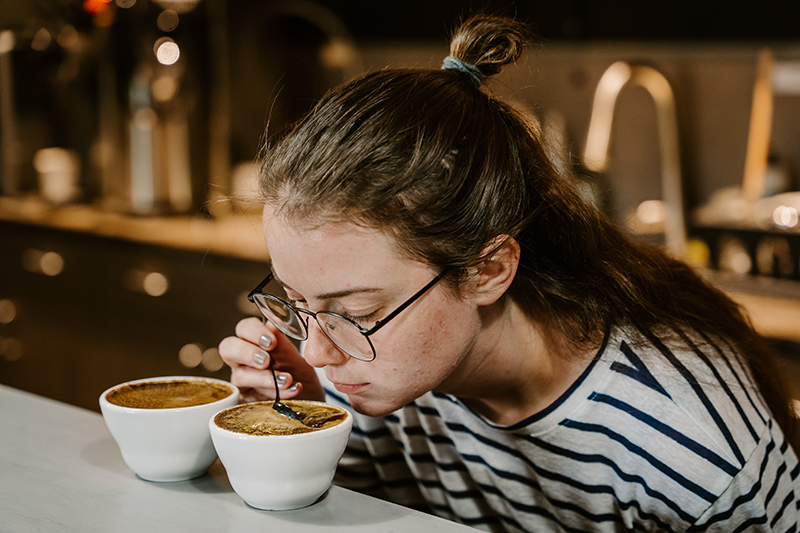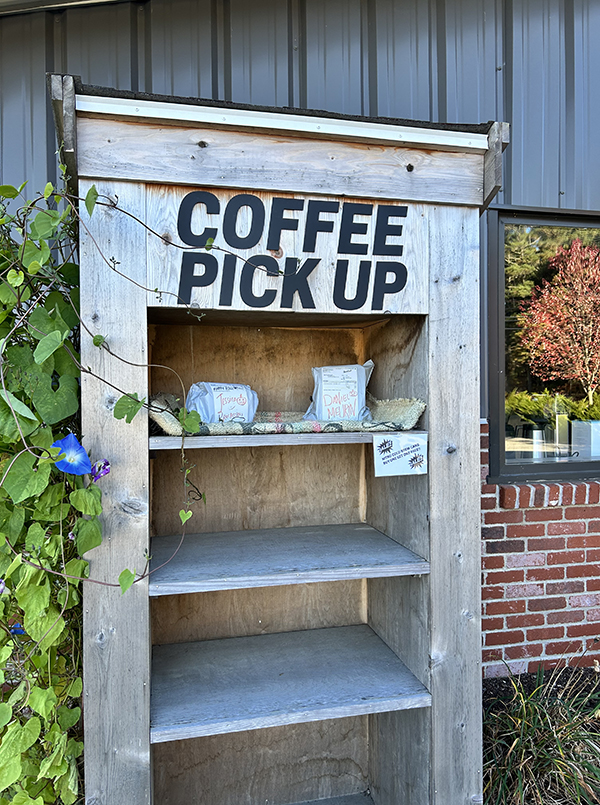Derek Anderson starts his morning with a cup of coffee. Sometimes several. Then he drinks more throughout the day. As owner of Speedwell Coffee, it’s part of the job. The day of our conversation he had tasted nine coffees from Guatemala. “That’s a lot,” Anderson conceded with a slight smile. “I’ve gotten more sensitive to it as I’ve grown older. I could brush my teeth with it before and it wouldn’t bother me.”
The company’s South Meadow Road headquarters is partly a modern retail space where regulars come to buy coffee by the bag, or even by the cup. Mostly, though, it’s a roasting, packaging, and shipping operation, featuring a large industrial space that almost always smells like that first fresh brew in the morning. The company services wholesale clients around Southeastern New England, mostly restaurants and cafes. It also sells online.
Before Speedwell, Anderson and his brother, Mark (who was working at Fidelity Investments), in 2004 started Kiskadee Coffee Company downtown. They succeeded Lalajava, which had once been the Book and Bean shop. Four years later, the brothers had opened a second Kiskadee location in Hanover and Derek was setting up a small roasting space in New Bedford. His days typically involved a triangular drive between Plymouth, Hanover, and New Bedford. The hours were long, and even heavy doses of caffeine couldn’t stave off a creeping exhaustion. The death of the Andersons’ father in the summer of 2008 led to a reckoning of sorts. (“It changed my perspective on things,” Derek said.) Eventually, they sold both shops, and Derek went solo to focus on roasting and the wholesale business. Today, he has seven employees and a loyal customer base both near and far.
Naturally, we sat down to talk over a cup of Speedwell coffee.
(This interview has been edited for length and clarity.)
What are we drinking today?
I brewed up one of my favorites. It’s from El Salvador.
Is it your go-to?
That changes all the time. My taste buds over the years have probably gotten a little bit lighter, and our roasting has changed a little bit, too. But we still definitely roast the full spectrum of coffees, the lighter, medium, dark roasts. I enjoy a cleaner, sweeter coffee that sort of leaves your palate, as opposed to a lingering dark roast or something like that.
What about customers’ preferences these days?
There’s still definitely a demand for darker coffees and we sell a good amount of them. But the lighter and a little bit sweeter coffees have become more popular. When I started Speedwell, it was around the same time when local food was gaining momentum. People started wanting to know where the product came from and they became interested in sourcing. So the coffee’s evolved with that. When I started, roasters wouldn’t even tell you what the coffee was. Now, we tell you exactly where it’s from, the farmer that produced it, where it was grown, the season, the elevation, everything.

What are the basics of making a good cup of coffee at home? It can feel intimidating.
We always suggest people weigh their coffee. You have to know how much to use. The biggest mistake people make at home is they don’t use the right amount of coffee. Most people don’t use enough. Weigh your water, and then weigh your coffee, so you have a ratio. We suggest starting at 16 to 1 – your coffee weight should be one sixteenth of your water weight.
That kind of sounds like work.
Not really, once you get in the habit of it. There are ways you could shortcut it with containers and all that. But if you want a coffee to be consistent like a cafe, or anywhere else where you have a really good cup of coffee, everything is driven by that. The other thing is to get a good home grinder. That will probably make the biggest change. If you had a blade grinder – which is like the old pulse blade grinder – and go to a burr grinder, you would think it was a whole different product, a whole different coffee. Once you get a consistent grind, it changes the game. If you don’t have a good grinder, you’re better off buying ground coffee.
Does it matter what water you use?
Don’t use any town water unless you filter it. It’s got chlorine in it. Put it through some sort of home filter, or an inline filter. Don’t use distilled water. If you’re going to use bottled water, use Poland Spring or something like that. You want some mineral content.
So that chlorine will affect the taste?
Definitely. It’ll taste like a swimming pool, in my opinion.

Where do you come down on the Dunkin’ versus Starbucks debate?
I would 100 times choose Starbucks.
Me, too, but Dunkin’ drinkers complain that Starbucks coffee tastes burnt.
Yeah, but from my, from my perspective, at least they’re brewing it with enough coffee. Dunkin’ doesn’t use nearly enough when they brew, so everything has the body and the consistency of tea to me.
If I had to buy coffee in a supermarket, what should I look for?
I would look for something that has a roast date, as opposed to an expiration date. If the bag tells you when it was roasted, that’s a good sign. The most commercial coffee I buy is definitely Starbucks. Other than that, if I go to a grocery store and buy coffee,
I’ll always buy a local coffee.
We Have Questions is the Plymouth Independent’s version of the classic Q&A column, a forum for conversations with local people of interest. We’re not worried about running out of subjects. Plymouth is full of fascinating characters – including entrepreneurs, public officials, educators, artists, musicians, authors, athletes, volunteers, nonprofit leaders, and many more. The idea is to have a casual conversation that steers clear of cliched questions and canned responses. If you know someone you think we should have a sit-down with, send us a note at questions@plymouthindependent.org. If you have the subject’s contact information, all the better. You can even suggest yourself – we won’t tell.

